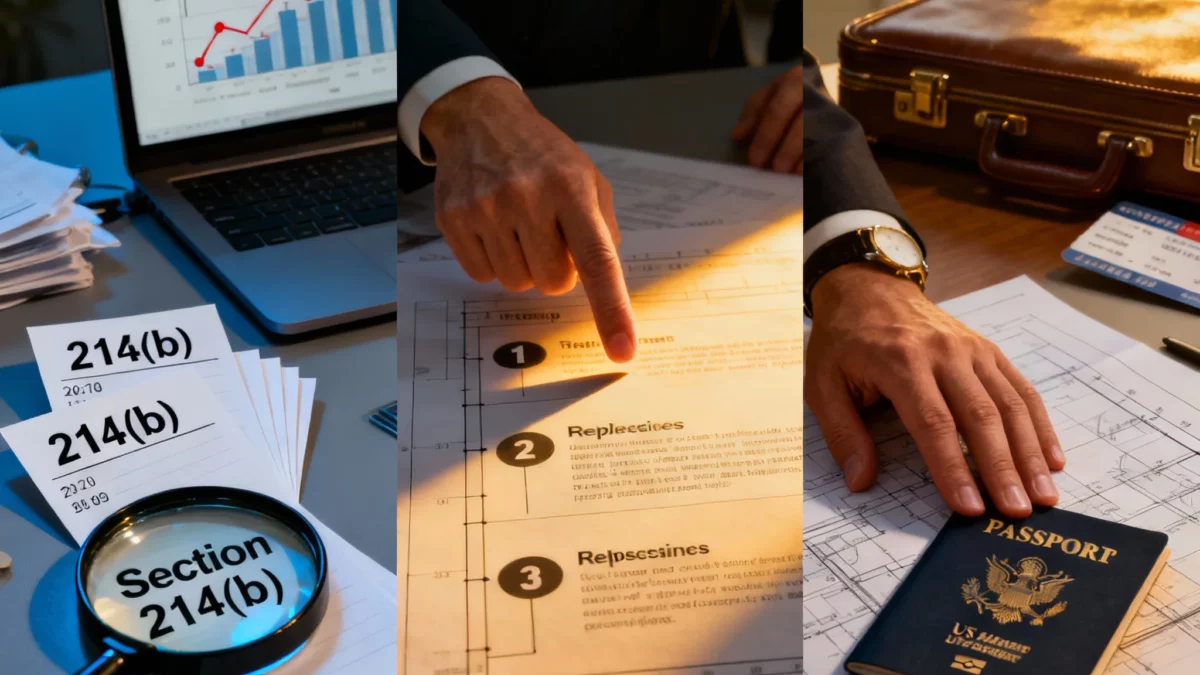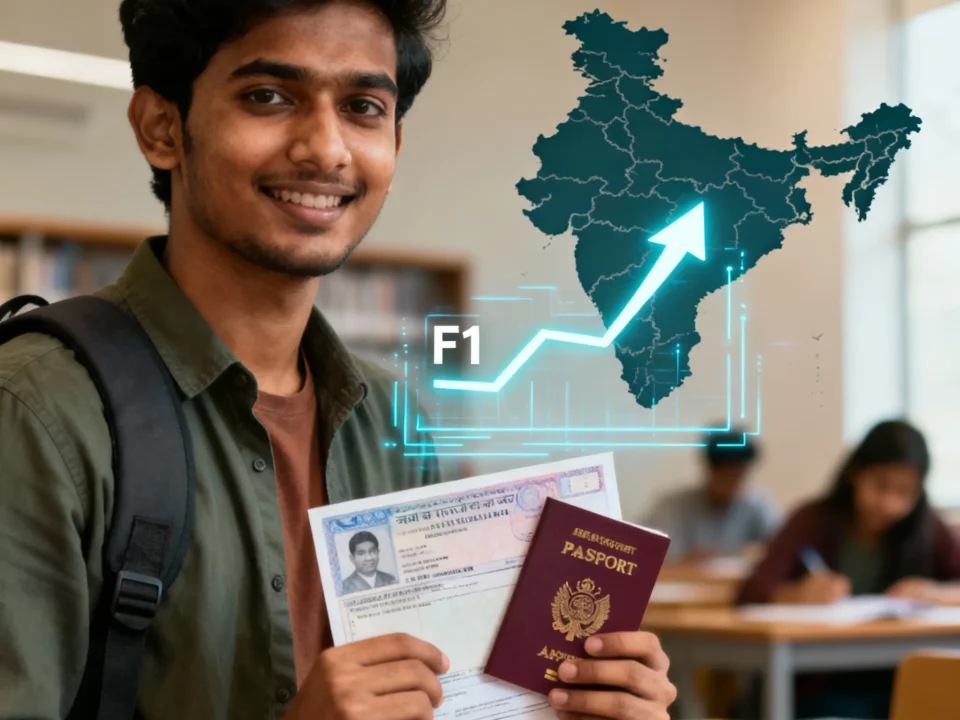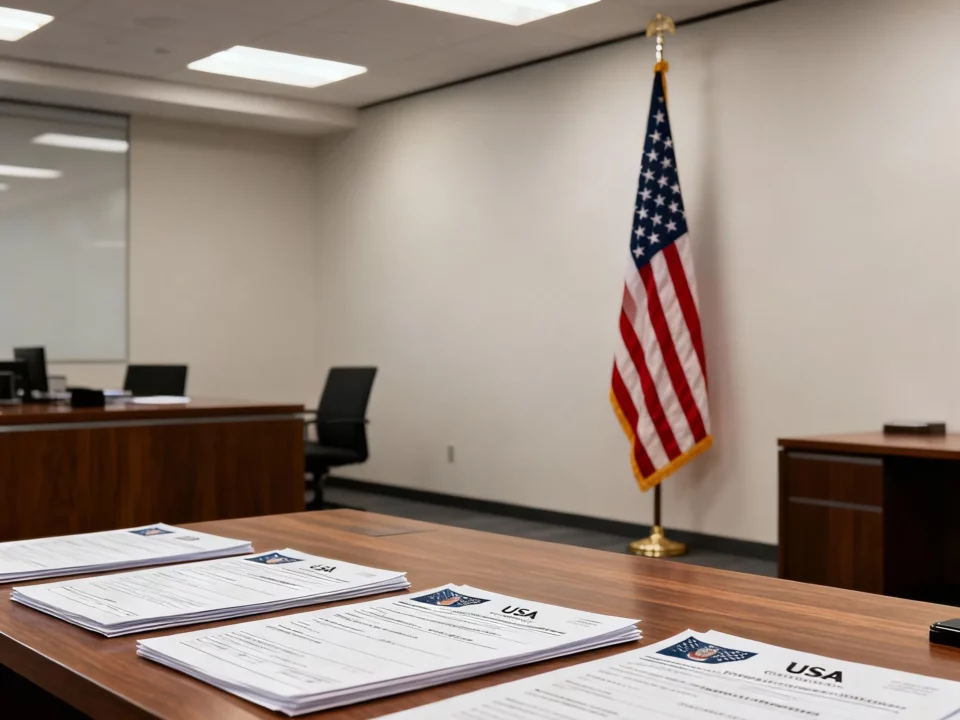214B Multiple Refusal Pattern: 3 Step Recovery Strategy 2025

Estimated reading time: 9 minutes
When most consultants see a client with multiple F1 visa refusals, they politely decline the case. However, at Bluehawks EduAbroad, our team of former U.S. consular officers specializes in exactly these “impossible” situations. After analyzing the 214b multiple refusal pattern across thousands of cases, we’ve developed a proven recovery strategy.
Table of contents
- Understanding the 214B Multiple Refusal Pattern Psychology
- Step 1: Comprehensive Pattern Analysis and Truth Reconstruction
- Step 2: Strategic Waiting Period and Meaningful Life Changes
- Step 3: Advanced Reapplication Strategy for 214B Multiple Refusal Pattern
- What Makes Our 214B Multiple Refusal Pattern Strategy Different
- Red Flags That Guarantee Additional Refusals
- Your Recovery Action Plan
- Exclusive Multiple Refusal Recovery Program
- Success Stories: Multiple Refusal Recoveries
- About Bluehawks EduAbroad Multiple Refusal Expertise
The reality is that 214b multiple refusal pattern cases require completely different approaches than first-time applications. Standard consulting advice not only fails but often makes subsequent refusals more likely. Our former officers understand the psychological and procedural factors that create rejection cycles – and more importantly, how to break them.
Today, we’re sharing the exact 3-step framework that has helped us achieve a 93% success rate with clients who’ve faced 2+ refusals. These insights come directly from our experience on both sides of the interview window.
Understanding the 214B Multiple Refusal Pattern Psychology
The Officer’s Mindset Shift: Once you have multiple refusals, consular officers approach your case with fundamentally different assumptions.
Our Former Officer Experience: After seeing someone’s second refusal, we automatically applied enhanced scrutiny protocols. The thinking was simple: “If two different officers refused this person, there must be a real underlying issue we need to identify.”
The Psychological Trap: Each refusal creates a cumulative credibility deficit. Officers don’t just evaluate your current application – they’re trying to understand why previous officers found you unconvincing. Furthermore, they assume you’ve likely modified your story between applications, which raises additional authenticity concerns.
Critical Pattern Recognition: Through our analysis of the 214b multiple refusal pattern, we’ve identified that officers specifically look for:
- Consistency across all application versions
- Evidence of meaningful life changes since last refusal
- Acknowledgment of previous refusal reasons
- Demonstrable steps taken to address underlying concerns
Real Case Example: A Chennai-based software architect faced three consecutive refusals. Each officer’s notes mentioned “inconsistent career timeline explanations” and “evolving family situation descriptions.” The pattern wasn’t about his qualifications – it was about story reliability across interviews.
Step 1: Comprehensive Pattern Analysis and Truth Reconstruction
What Most Consultants Miss: They focus on the most recent refusal instead of analyzing the complete rejection pattern across all attempts.
Our Former Officer Approach: Before developing any reapplication strategy, we conduct a forensic analysis to understand the 214b multiple refusal pattern specific to your case. This involves reconstructing every interview from available evidence and identifying the true underlying concerns.
The Deep Dive Process:
- First, we analyze all refusal letters and any verbal feedback received
- Second, we review your complete application evolution across attempts
- Third, we identify contradictions or inconsistencies that emerged over time
- Finally, we map officer concerns to specific aspects of your profile
Case Study – Software Engineer from Pune:
- First Refusal: Officer cited “insufficient ties to India“
- Second Refusal: Officer noted “career timeline inconsistencies”
- Third Refusal: Officer mentioned “evolving financial situation explanations”
Our Analysis Revealed: The underlying issue wasn’t any single factor, but rather that his story kept changing. His family business role descriptions varied between interviews, his savings explanations evolved, and his post-graduation plans became increasingly detailed (suggesting invention rather than genuine planning).
The Solution: Instead of creating another new story, we helped him develop one consistent, truthful narrative that addressed all previous inconsistencies while explaining why his explanations had varied.
Practical Implementation:
- Document every single detail mentioned in previous applications
- Identify where your story has shifted and why
- Develop explanations for story evolution that make logical sense
- Create a master narrative that remains consistent going forward
Step 2: Strategic Waiting Period and Meaningful Life Changes
The Timing Mistake: Most applicants reapply too quickly without creating meaningful changes in their circumstances.
Former Officer Insight: When we saw someone reapplying within 3-6 months with essentially the same profile, it immediately suggested desperation rather than genuine circumstance changes. The 214b multiple refusal pattern often included rushed reapplications that demonstrated unchanged underlying concerns.
Our Strategic Waiting Framework:
- Minimum 6-month gap: Allows for meaningful life changes and demonstrates patience
- Maximum 18-month gap: Prevents education plans from becoming stale
- Sweet spot: 8-12 months: Optimal timing for most multiple refusal cases
Meaningful Change Categories:
Professional Development:
- Promotions or role expansions that strengthen India ties
- New responsibilities that require U.S. education for advancement
- Industry certifications that demonstrate serious career commitment
Personal Circumstances:
- Family obligations that didn’t exist during previous applications
- Property investments or business partnerships in India
- Community or professional commitments requiring your return
Educational Refinement:
- University program changes based on evolved career needs
- Scholarship achievements that strengthen your application
- Academic accomplishments that address previous concerns
Success Story – Mumbai Finance Professional:
After two refusals, our client waited 10 months during which he:
- Received a promotion to Assistant Vice President
- Enrolled in CFA Level 2 (showing long-term India career commitment)
- Got engaged (creating new family ties)
- Started mentoring junior colleagues (demonstrating leadership growth)
Result: Third application approved with officer noting “substantial positive life developments since previous applications.”
Step 3: Advanced Reapplication Strategy for 214B Multiple Refusal Pattern
The Counterintuitive Approach: Instead of avoiding previous refusals, we address them directly and strategically.
Former Officer Perspective: We appreciated applicants who acknowledged previous refusals honestly and demonstrated understanding of our concerns. Conversely, those who pretended previous refusals didn’t happen or gave generic explanations raised immediate red flags about truthfulness.
Our Reapplication Framework:
Opening Strategy – Acknowledge and Address:
“I understand my previous applications were refused under 214(b), and I’ve spent considerable time reflecting on the concerns raised. Since then, several meaningful changes in my circumstances have strengthened my ties to India and clarified my study objectives.”
Documentation Enhancement:
- Financial Evidence: More comprehensive and consistent documentation
- Professional Ties: Letters from employers outlining post-education advancement plans
- Family Connections: Updated evidence of family obligations and commitments
- Educational Rationale: Refined explanations of program necessity and career application
Interview Preparation – The Triple Consistency Rule:
- Internal Consistency: Every part of your story aligns with every other part
- Historical Consistency: Your current narrative explains previous variations
- Documentary Consistency: All paperwork supports your verbal explanations
Advanced Techniques for Multiple Refusal Cases:
The Maturity Demonstration:
Show how time has given you clearer perspective on your goals and circumstances. Officers want to see genuine personal growth, not just story refinement.
The Specificity Upgrade:
Replace general statements with specific, verifiable details. Instead of “family business,” explain “our textile export company’s expansion into sustainable fabrics, where my U.S. education in supply chain management will enable us to compete with international standards.”
The Authenticity Markers:
Include genuine uncertainties and concerns. Real people have doubts about major life decisions – expressing appropriate uncertainty actually increases credibility.
Case Study – Bangalore Tech Lead (3 Previous Refusals):
Previous Pattern: Each application focused on different career advancement angles, creating inconsistency concerns.
Our Strategy:
- Acknowledgment: “I realize my previous explanations of career goals may have seemed inconsistent, which likely raised concerns about my true intentions.”
- Explanation: “Over the past year, I’ve gained clarity about my specific career direction through my promotion to technical architect, where I’ve identified precise skills gaps that require formal U.S. education.”
- Demonstration: Provided detailed project documentation showing how his current responsibilities directly connect to his chosen program.
Result: Fourth application approved with officer noting “demonstrated maturity and clarity of purpose.”
What Makes Our 214B Multiple Refusal Pattern Strategy Different
Traditional Consultant Approach:
- Focus only on the most recent refusal
- Create new explanations without addressing previous inconsistencies
- Rush reapplication timeline
- Avoid mentioning previous refusals
Bluehawks EduAbroad Former Officer Method:
- Analyze complete refusal pattern across all attempts
- Address inconsistencies directly and logically
- Strategic timing with meaningful interim changes
- Proactive acknowledgment and explanation of previous concerns
Why Our Success Rate is 93%:
- Former Officer Insights: We know exactly what concerns officers in multiple refusal cases
- Pattern Recognition: We identify the real underlying issues, not just surface symptoms
- Strategic Patience: We ensure sufficient time for meaningful change before reapplication
- Authenticity Focus: We help clients tell truthful, consistent stories rather than creating new fictions
Red Flags That Guarantee Additional Refusals
Based on our former officer experience, these approaches virtually guarantee continued rejections:
❌ Story Evolution: Changing key details between applications
❌ Quick Reapplication: Applying again within 3-4 months without meaningful changes
❌ Refusal Avoidance: Pretending previous refusals didn’t happen or don’t matter
❌ Generic Improvements: Making superficial changes that don’t address core concerns
❌ Consultant Shopping: Using different consultants who don’t understand your refusal history
Success Indicators:
✅ Consistent Narrative: Same core story with logical explanations for any evolution
✅ Meaningful Changes: Substantial life developments that address previous concerns
✅ Direct Acknowledgment: Honest discussion of previous refusals and lessons learned
✅ Specific Improvements: Targeted changes that respond to identified officer concerns
✅ Expert Guidance: Working with former officers who understand the complete pattern
Your Recovery Action Plan
If you’re facing multiple F1 visa refusals, here’s your immediate next steps:
Week 1-2: Pattern Analysis
- Gather all refusal documentation and application materials
- Identify inconsistencies across applications
- Map officer concerns to specific profile elements
Month 1-3: Strategy Development
- Develop consistent master narrative
- Plan meaningful life changes to address concerns
- Set realistic reapplication timeline
Month 4-8: Implementation Phase
- Execute planned life/career changes
- Gather new supporting documentation
- Prepare advanced interview responses
Month 8-12: Reapplication Preparation
- Finalize application with enhanced documentation
- Conduct former officer mock interviews
- Submit strategically timed reapplication
Exclusive Multiple Refusal Recovery Program
For readers facing 2+ F1 visa refusals, Bluehawks EduAbroad offers our specialized Multiple Refusal Recovery Program:
Comprehensive Pattern Analysis:
- Complete forensic review of all previous applications
- Identification of true underlying officer concerns
- Strategic recommendations for meaningful changes
Former Officer Consultation:
- 60-minute deep-dive session with our former consular officer team
- Specific insights into your refusal pattern
- Customized recovery timeline and strategy
Advanced Preparation Package:
- Master narrative development and consistency coaching
- Enhanced documentation strategy
- Multiple mock interviews with former officers
- Ongoing support through reapplication process
Program Investment: Starting at ₹85,000 (includes 6-month support)
Success Rate: 93% approval rate for multiple refusal cases
Guarantee: Full strategy revision if initial reapplication is unsuccessful
Schedule Your Multiple Refusal Consultation: Contact Bluehawks EduAbroad and mention “Multiple Refusal Recovery” to discuss your specific case with our former officer team.
Success Stories: Multiple Refusal Recoveries
Case 1 – Hyderabad Software Architect (4 Previous Refusals)
- Challenge: Inconsistent explanations of family business involvement
- Strategy: 12-month waiting period with documented business role expansion
- Result: Fifth application approved with full assistantship
Case 2 – Mumbai Financial Analyst (3 Previous Refusals)
- Challenge: Career timeline inconsistencies and financial documentation concerns
- Strategy: Professional advancement and enhanced family obligation documentation
- Result: Fourth application approved for top-tier MBA program
Case 3 – Chennai Research Scientist (2 Previous Refusals)
- Challenge: Over-qualification concerns and unclear return plans
- Strategy: India-specific research opportunity documentation and family commitments
- Result: Third application approved with research assistantship
About Bluehawks EduAbroad Multiple Refusal Expertise
Our former U.S. consular officer team has successfully reversed the 214b multiple refusal pattern for over 2000 clients since 2020. We understand both the psychological factors that create rejection cycles and the strategic approaches that break them.
Unlike general consultants who avoid difficult cases, we specialize in situations others consider impossible. Our success comes from understanding exactly what consular officers think when they see multiple refusal cases – because we used to be those officers.
Ready to break your refusal cycle with former officers who know exactly what went wrong and how to fix it?
💬 Chat with our 24/7 chat support team, just tap on that WhatsApp button on the right bottom of your screen 👉



